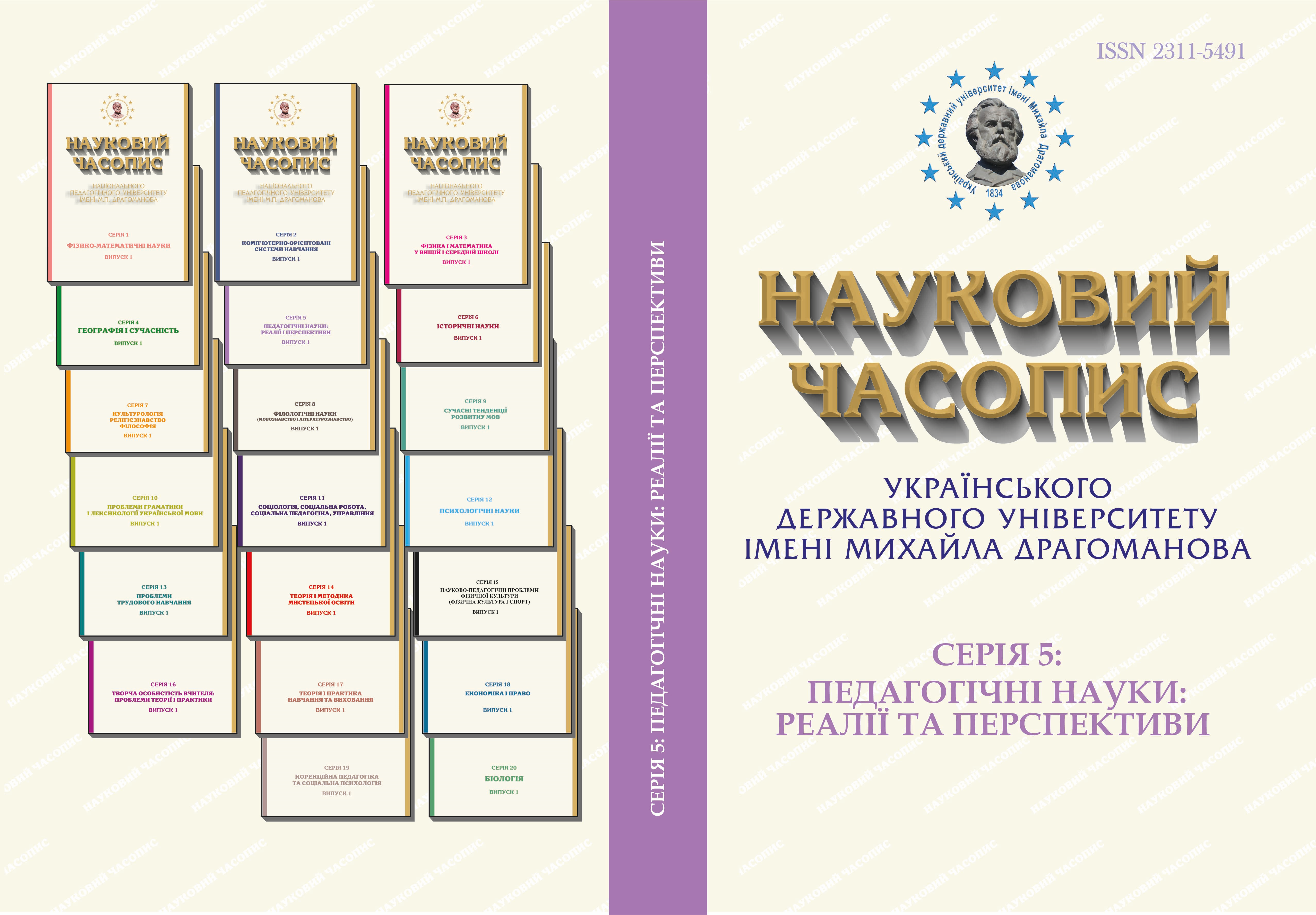Naukovyi Chasopys № 75
Title page
Contents
Babakina O. O. Advancing the system of professional teacher development at universities in the USA from the last quarter of the 20th to the early 21st century
Batrun I. V. Patriotic and moral and ethical education according to V. Sukhomlynsky
Bilostotska O. V. Essence of professional competence of future music teacher
Binytska K. M., Buchkivska H. V., Balukh M. M. Unesco’s activities on implementing the ideas of education for sustainable development in school textbooks
Bovsunivska G. G. Formation of environmental experience junior schoolchildren in the educational process New Ukrainian School
Bovsunivskyi V. M. Interaction of school and family in aesthetic education of students
Garbar. S. V. Education of the basics of the culture of behavior of older preschool children as a pedagogical problem
Hedzyk A. M., Susla N. M. Peculiarities of the use of creative tasks in the process of graphic training of future teachers of practical study in the field of computer technologies
Gerasymchuk V. V., Zhorniak B. Ye. Pedagogical conditions of formation of artistic abilities of future music teachers by theatrical pedagogy methods
Holubnycha L. O. Historiography of the views of didactives of the end of the XX century on the forms of organization of education in higher school
Horokhivska Т. М. The concept for developing professional-pedagogical competency in lecturers of professional disciplines from technical universities
Goryanskiy V. V. Conditions for the formation of professional competence of future Bachelors of Design in the process of studying art and design disciplines through visual arts
Danylenko L. I., Shvets T. E., Balakshyna O. M. An innovative model of the secondary education management on the grounds of blended learning and tutoring: the results of the experiment
Dmitriieva N. S. Professional mobility of future specialists in physical therapy
Diachok S. O. The comparative analysis of Hryhoriy Skovoroda’s and Lina Kostenko’s works in the curriculum of Ukrainian literature
Yevtushenko N. V. Polish experience of qualification improvement of teachers of natural and mathematical subjects, and possibilities of its application in Ukraine
Zakaulova Yu. V., Drapaliuk H. S. Applying new approaches while organizing higher education in Belgium
Zalutsky I. I., Denysiuk O. M., Chechko T. M. The use of information and communications technology (ICT) in work with parents who bring up a child with a disability
Zevako V. I. Formation of the linguistic scientific competence at the classes of Ukrainian as a foreign language (educational and methodological materials)
Zubenko V. O. Innovative aspects of foreign language teaching to future lawyers in the context of blended learning
Kalimanova O. O. The semantic component of the literature lesson as a means of forming the student’s national and cultural identity
Kanibolotska O. A. Pedagogical practice as a leading component of life-learning training of a foreign language teacher at the university
Klishevych N. A., Rizak I. M. Features of social work with disabilities in the United Kingdom
Korostiyanets T. P., Niedialkova K. V. The solution of case studies as a means of improving the methodical training of future mathematics teachers
Liutyi V. P. Havryliuk K. O. Criteria for assessment the quality of social support the families in difficult life circumstances
Liashenko M. Yu. Free choice of educational disciplines by prospective vocational training teachers based on a marketing approach
Makarenko L. L., Shpylovyi Yu. V. Application features of computer modeling technologies upon studying information science disciplines by future professional teachers
Matseykiv T. I. Ways, forms and methods of formations of civic competence of lyceum students during lessons of history of Ukraine
Mykhniuk S. V. Interaction as a base type of a social worker’s tasks: analysis of the concept
Movchan L. H., Holovska I. V. From the Swedish experience of implementing STEM-education
Moroz O. L. The strategic component of professionally-oriented communicative competency of seafarers
Oliinyk N. A. Innovative technologies of training in the training of future agricultural specialists
Pavlova N. S. Professional training of informatics teachers in higher education institutions on basics competence approach
Poluliashchenko Yu. M. Opportunities for independent work in formation of professional readiness of future teachers of physical culture to education of patriotic values of student youth
Popadiuk S. S. Special aspects of teaching a second foreign language in the context of e-learning
Rudiuk T. V. Reflection of family vocabulary in the anthology of pedagogical thought (communicative-activity aspect)
Samoylenko O. O. Organizational support of the training of Bachelors of Cybersecurity under the conditions of a digital learning environment
Samoilenko T. I., Kozlova L. B., Kravchenko O. P. Formation medical students’ self-educational competence
Sydorchuk O. V. Application of educational and developmental opportunities of innovative technology in ELSP training of journalists
Smola O. V. Characteristics of the emotional state of children with mental disorders in preschool institutions
Stefanyshyn K. L., Tyshkovets M. P. Teaching and learning materials for the study of the topic “Seasons and Months” during the classes of Ukrainian as a foreign language
Filippova L. V. New information technologies in the learning process of chemical disciplines by future pharmacists
Khomenko L. V. Theoretical aspects of building promoting tolerance among chorus adolescent members
Tsurkan T. H., Popova U. P. Education of civic charity in junior schoolchildren at lessons “I explore the world”
Chystiakova L. O. Component-structural analysis of ecological culture of future teachers of handicraft education and technologies









